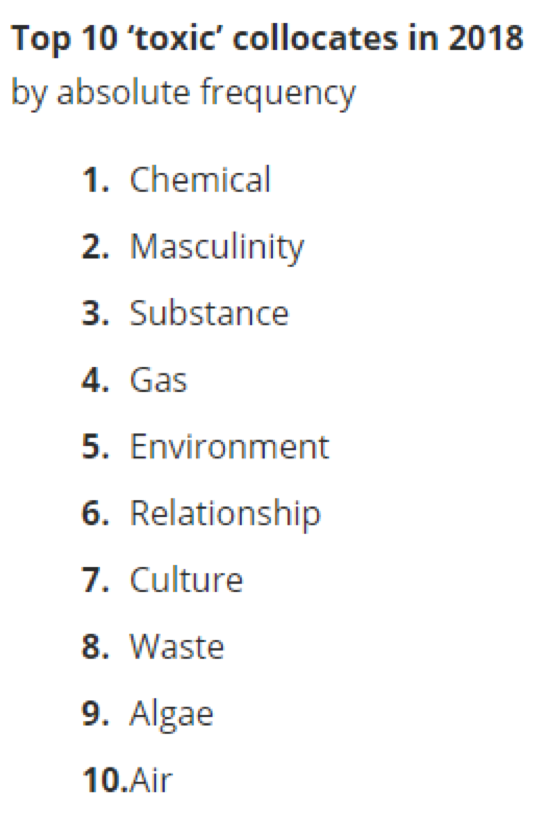《牛津词典》2018年度词汇出炉:toxic当选最具年度特色词
互联网2018-12-26 15:41
从2004年开始,牛津词典每年年末都会发布一个最具年度特色的词语,被称为“牛津年度词汇(The Oxford Word of the Year)”,类似中国新的一年很流行的“佛系”、“锦鲤”这样的热词。所有的流行词汇都与社会的变化与流行现象息息相关,“牛津年度词汇”的词也是一种对英语社会的反映。
那么什么词最能总结今年的英语社会?
提示:emmm…这是一个非常“有毒的”词。
是的,今年《牛津词典》选取的年度词汇是toxic:有毒的。
Oxford Dictionaries has chosen the word 'toxic' as their 2018 word of the year.
“Toxic”来源于中古拉丁文toxicus,在17世纪中期首次出现在英语里,在过去一年还被用来描述工作场所、学校、人际关系、文化和压力。
First appearing in English in the mid-17th century, from the medieval Latin toxicus, “toxic” has also been used to describe workplaces, schools, relationships, cultures and stress over the last year, said the dictionary.
不过,为啥toxic可以当选年度词汇呢?
Why was toxic chosen as Word of the Year?
《牛津词典》解释,年度词汇反映了这一年来大家的呼声、情绪以及最关切的事件,并且有持久的文化影响力。
The Oxford Word of the Year is a word or expression that is judged to reflect the ethos, mood, or preoccupations of the passing year, and have lasting potential as a term of cultural significance.
《牛津词典》方面表示,根据数据统计,词典官方网站上,toxic的搜索上升了45%。同时,toxic使用也大大增加,不仅仅是其字面意义,还包括更多修辞上的表达。
Our data shows that, along with a 45% rise in the number of times it has been looked up on oxforddictionaries.com, over the last year the word toxic has been used in an array of contexts, both in its literal and more metaphorical senses.
先来感受一下2018年“中毒最深”(搜索频率最高)的10大“毒物”:
Drawn from our corpus, the top 10 toxic collocates for the year – that is, words habitually used alongside toxic – are indicative of this.

在《牛津词典》的语料库中,经常跟toxic搭配的10个词包括:
Drawn from our corpus, the top 10 toxic collocates for the year – that is, words habitually used alongside toxic – are indicative of this.
Chemical 化学品Masculinity 男子气概Substance 物质Gas 油气Environment 环境Relationship 关系Culture 文化Waste 垃圾Algae 藻类Air 空气
Toxic加environment,除了广泛形容有毒的工作环境,也指那些对人精神健康产生影响的环境。
The term toxic environment itself, however, has been more frequently used in reference to harmful workplace environments and the toll this takes on the workforce’s mental health.
除了形容化学品和空气等有毒,其他层面的“有毒”也同样惹人关注。比如toxic与masculinity的搭配高居第二。这是因为反性骚扰的#MeToo运动如火如荼,这也让人们开始关注那些“有毒的”男子气概。
Our corpus data shows that, after ‘chemical’, ‘masculinity’ is the most-used word in conjunction with toxic this year. With the #MeToo movement putting a cross-industry spotlight on toxic masculinity, the term toxic masculinity has well and truly taken root in the public consciousness and got people talking in 2018.
除了有毒的toxic,今年的年度词汇候选列表(shortlist)也同样精彩。
牛津词典还给出了8个上榜单词。
Big Dick Energy (BDE):大吊能量,形容一种轻描淡写的自信态度。
Cakeism:蛋糕主义。主要在英国使用,指一种想法,认为人们可以同时享受或利用两种值得拥有但相互排斥的替代品。(如果你还不能理解,想一想英国脱欧或许就明白了。)
Gammon:原指腌猪腿肉,现在用来形容那些气得涨红脸的“脱欧”支持者,这些人通常是中年白人男性。因此这个词就成了代指中年白人脱欧支持者的贬义词。
Gaslighting:这个词在牛津和《柯林斯》的年度评选中都入围了。Gaslight的字面意思是煤气灯,在心理学中有利用心理学手段让人接受某个对现实的错误描述,继而产生怀疑和否定自我的情绪。通俗点说,或许可以称之为“忽悠”(看过小品《卖拐》的小伙伴一定能意会了)。
Incel:这个词其实是involuntarily celibate的缩写,意为“非自愿的禁欲者”。最早网络上的一群宅男以这个词自称,认为自己不善于交际,无法吸引女生。但去年11月,这个“Incels”网络社群由于“仇视女性,甚至策划犯罪”遭到关闭。国外媒体也常常把incel和misogynist(厌女者)相提并论。
Orbiting:指突然退出和某人的直接联系,但仍然关注着对方的社交媒体活动,甚至有时还会进行回复。
Overtourism:过度旅游。过多的游客蜂拥而至,导致景点拥挤不堪,破坏当地环境和历史遗迹,影响当地居民的生活质量。
Techlash:科技抵制潮。最早出现在《经济学人》2013年的文章标题中,文章猛烈抨击了谷歌、Facebook等硅谷科技巨头。如今Facebook数据泄露丑闻频发,“Techlash”也被越来越多人使用。
相关推荐
- “黑人抬棺”是什么梗,用英语怎么说?
- 网红KoL流量明星...直译就可以表示吗?
- 英语热词:上热搜的“trigger warning”是什么意思?
- “你简直slay全场”,“slay”到底是什么意思?
- 新东方APP下载入口
- 新东方APP下载入口



